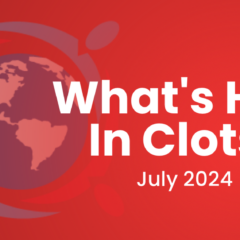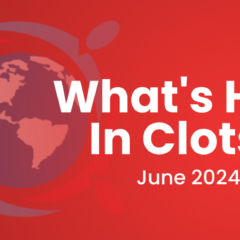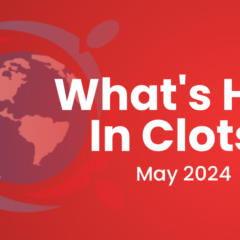Last updated on
Clot Chronicles: What’s New in 2020
Hello, I’m Dr. Sam Goldhaber, President of NATF, and I’m at Brigham and Women’s Hospital. And today, on Clot Chronicles, I’m going to talk about looking toward developments in 2020. What we’ve had in 2019 is truly spectacular in terms of FDA approval of new medications and new strategies.
Starting with prevention of deep vein thrombosis (DVT) and pulmonary embolism (PE), the FDA has approved the use of rivaroxaban, also called Xarelto, to begin on the day of hospital discharge for a medical illness, such as pneumonia or heart failure, and to continue for the next five weeks.
This is a very important development because a tremendous number of patients during this critical four- or five-week period after hospital discharge are at very high risk for developing either PE, DVT, or both. And rivaroxaban has been shown in two very large clinical trials to cut down dramatically on the frequency of venous thromboembolism (VTE).
Until now, the American healthcare providers as a community have not embraced the concept of prescribing preventive anticoagulation at the time of discharge from the hospital. But the data to support this concept are very strong. And 2020 will really be a very telling year to see whether this FDA-approved strategy truly takes off and is embraced by those who are working in the hospital, and then who have to communicate their prescription of the anticoagulant to the outpatient primary care provider.
The other very recent FDA approval is for a proprietary fish oil that goes by the trade name of VascepaÒ. This was studied in a global trial called REDUCE-IT. The thought was to take patients with high triglyceride levels and randomize them either to these fish oil capsules twice daily, or to placebo. And remarkably, those patients who were randomly assigned to receive Vascepa had a 25% reduction in heart attack and stroke compared to those patients who received the placebo. And until now, there has been no safe and effective treatment for lowering triglycerides that results in reduction of major adverse cardiac events such as heart attack and stroke.
Now, there’s a little wrinkle here in that in the REDUCE-IT trial, about 10% of the patients got into the trial even though they had normal triglyceride levels. And in those patients with normal triglyceride levels, they had exactly the same 25% reduction in heart attack or stroke, raising the question of whether the triglyceride reduction really has anything to do with the outcome of heart attack and stroke reduction.
Also, there was no dose-response curve in terms of the level of the triglycerides. In other words, patients with super high triglycerides who received Vascepa had a 25% reduction in heart attack and stroke, compared with patients with only mild elevations who had the 25% reduction in heart attack and strokes, compared with patients with normal triglycerides who had the same reduction.
So, it will be very intriguing to see in 2020 whether a new trial is put together that doesn’t require any increase in triglyceride levels just to test the concept of using this proprietary fish oil for patients who have other risk factors for coronary artery disease or for stroke.
And so, those are some tidbits to look for in 2020. This is Dr. Sam Goldhaber signing off for Clot Chronicles.



